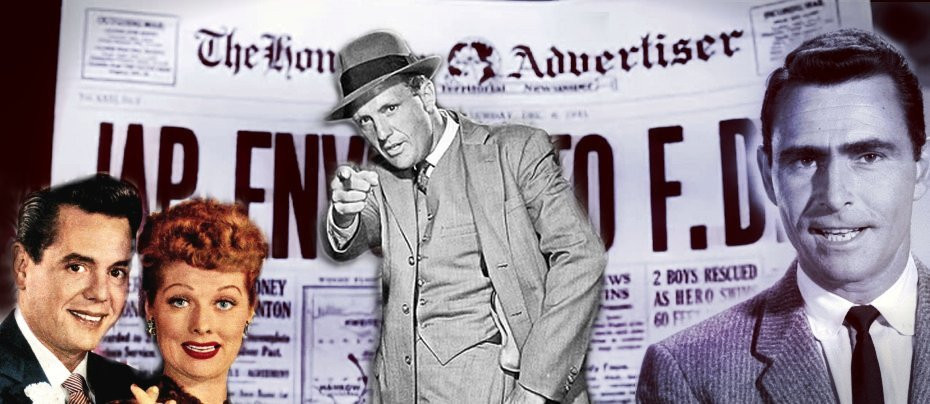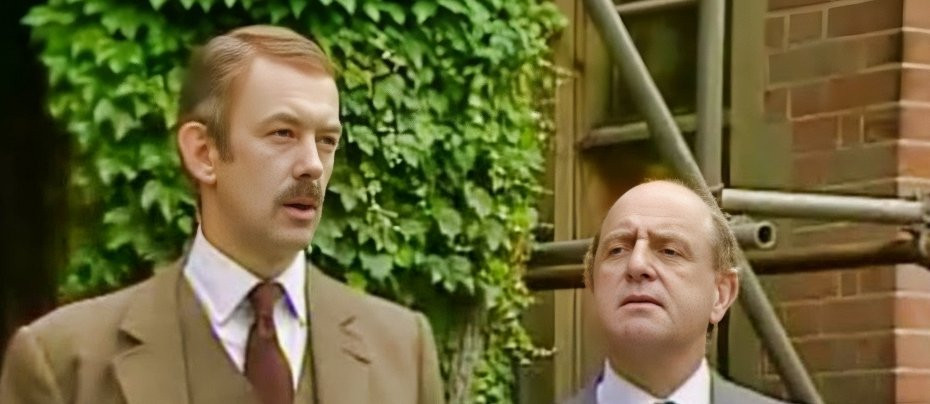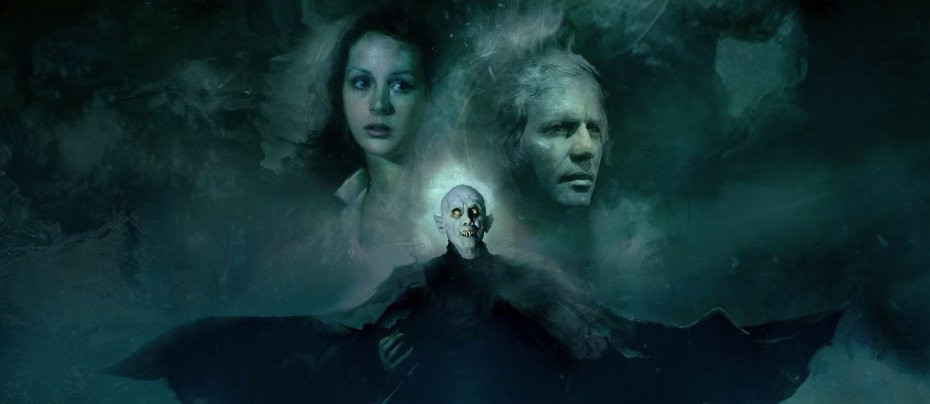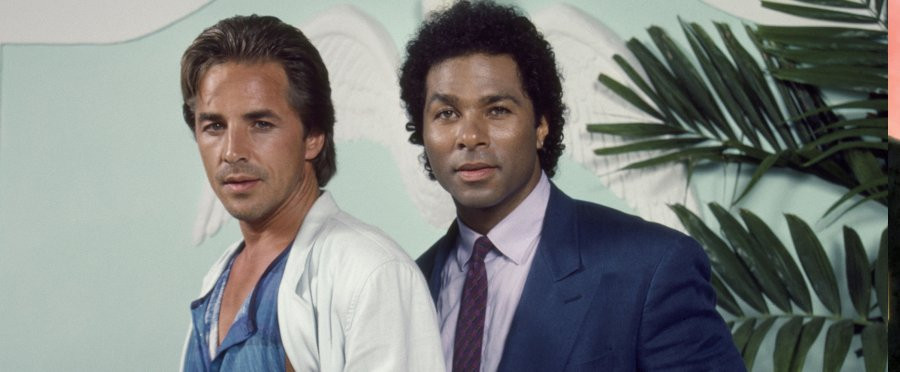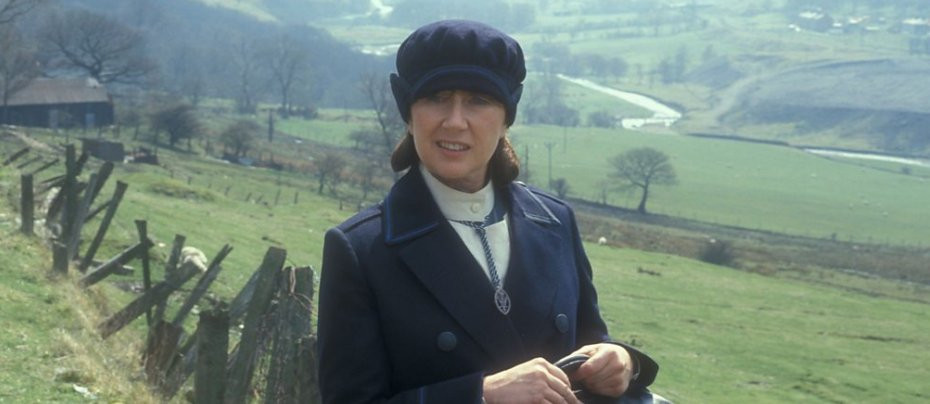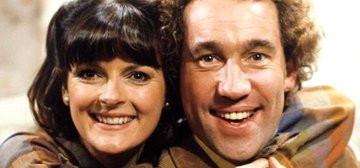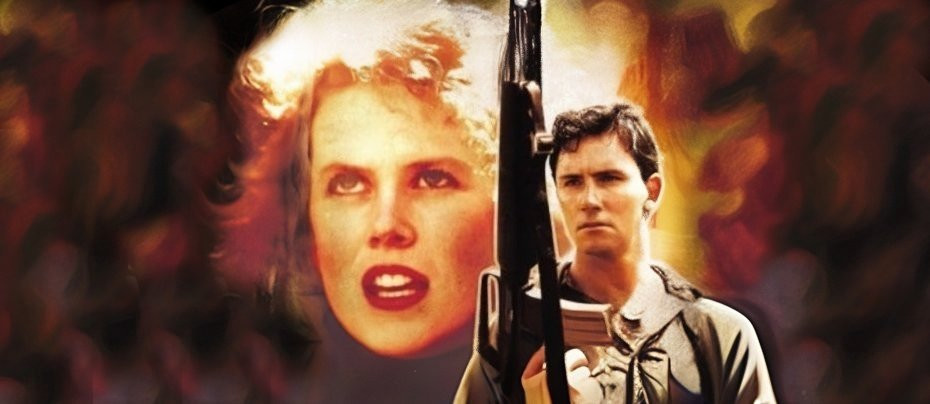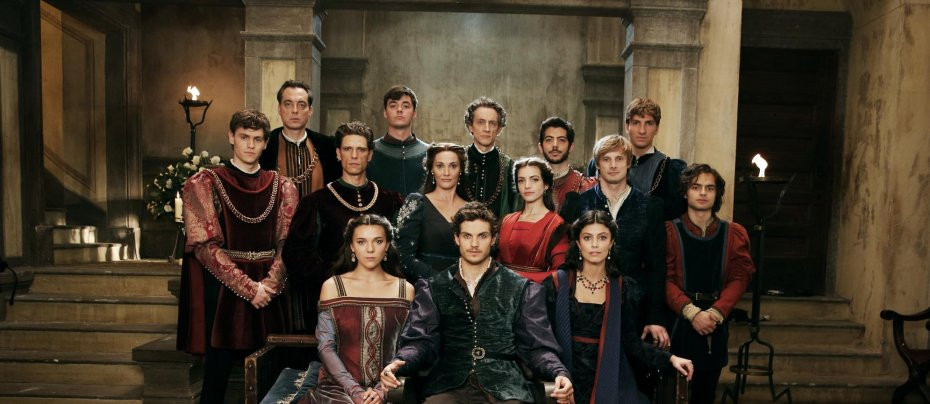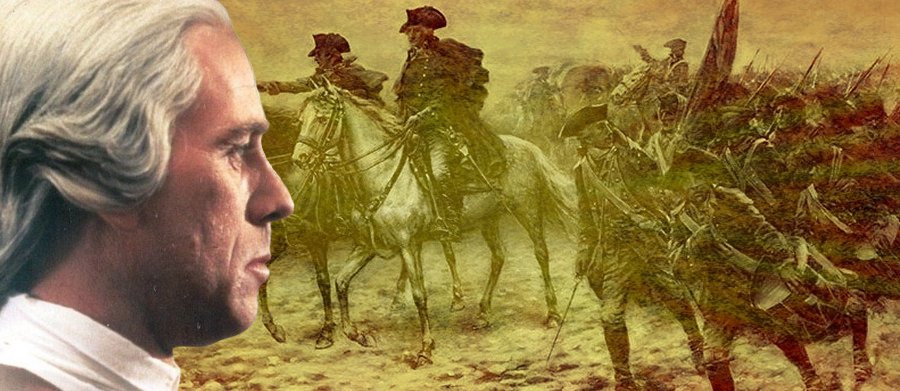
George Washington
1984 - United StatesGeorge Washington was without question a very great man. Although the decisive blow in the American War of Independence was actually struck by the French, it was Washington who had previously kept the rebellion going by sheer force of character on at least two occasions when it would probably have collapsed without him. He later went on to define the role of Head of State in a modern Republic at a point when some form of dictatorship looked to be a more likely alternative.
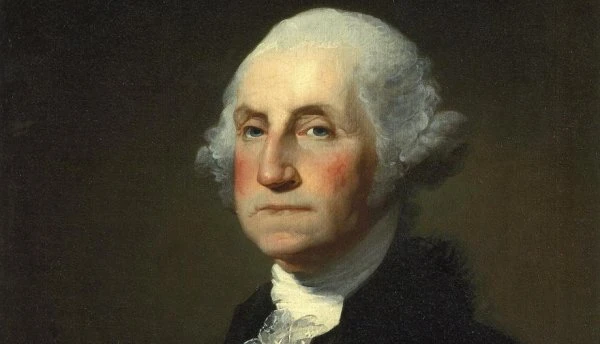
Yet he presents a lot of problems if he is to be a sympathetic protagonist in a drama. As a national hero, he is not as likeable as Abraham Lincoln. He was a stiff, reserved, class conscious gentleman with a fine sense of his own dignity. Then there is the slavery thing...
Where Lincoln gets the credit (not entirely deserved) for freeing the slaves, Washington, like many of the "Founding Fathers" of the United States, financed his whole public career with the forced labour of black people kidnapped from Africa, or at least their descendants.
In this context, claims that they were fighting for "freedom" from the British - whose "tyranny" and "oppression" consisted of asking the Colonists to pay for a share of their own defence and to refrain from rioting - now look a bit threadbare. Indeed, British atrocities were so conspicuous by their absence, even once full scale war was underway, that Mel Gibson had to make them up in his virulently anti-British film 'The Patriot' to evoke any sympathy for his protagonists.
This good looking 1984 American "miniseries" does not go that far, but it does give us a very traditional portrait of Washington. All television is a reflection of the time in which it was made, and, with Ronald Reagan on his way to a landslide re-election to the White House on the basis of a restored American patriotism after the national crisis of self-doubt in the 1970s, a revisionist Washington was not a serious commercial option at that point.
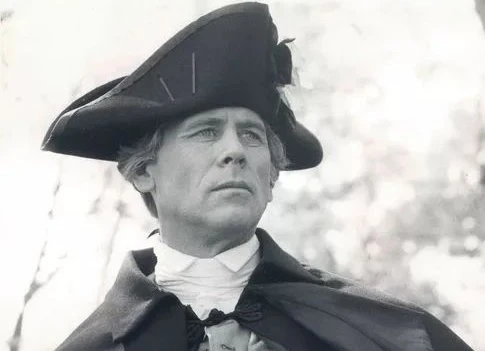
In fairness, the adaptation does hint at some of the failings behind the official image: Washington's obsession with his own status, his social awkwardness, his poorly concealed ambition, his volcanic temper, and his difficult relationship with a strong minded mother - something he has in common with a remarkable number of other great men. Barry Bostwick, a very familiar face in "miniseries" around this time, gives us a very human Washington, possibly a lot more amiable than the original might have appeared. Attempts at forced jollity and heartiness strike a false note. Even more jarring is presenting him as a relative "liberal" on slavery. That he was, in some ways, a relatively "benevolent" slave owner - emphasis on the "relatively" - and later expressed doubts about slavery only makes it worse that he still exploited others as he did.
The script references the fact that Washington was notable among his contemporaries for his height, so Bostwick may seem too short, but - fun fact - Bostwick (6'4") is actually taller than Washington (6'2"), the actors around him also being on average taller than most people in the 18th Century. Overall, Bostwick does good work as a romantic hero in a historical drama, even if he is not quite the historical Washington.
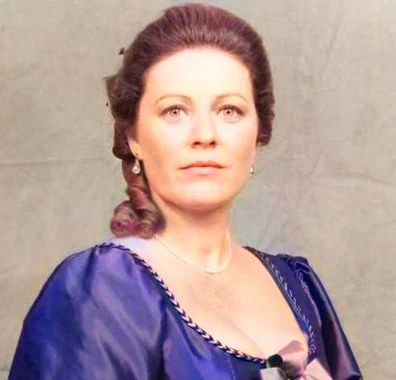
It is also to Bostwick's credit that he is not overshadowed by a very strong supporting cast. Patty Duke is a warm and gentle Martha Washington, while Jaclyn Smith is flirtatious as the Loyalist's wife on whom Washington is said to have had a crush. Lloyd Bridges enjoys himself in a huge wig and false beard as a grizzled frontier scout. Jose Ferrer is commanding, as always, as a British Governor. Trevor Howard is an ebullient Lord. Hal Holbrook and Richard Kiley, both experienced "miniseries" veterans, are well cast as politicians, as is Harry Groener, the future Mayor of Sunnydale in Buffy the Vampire Slayer.
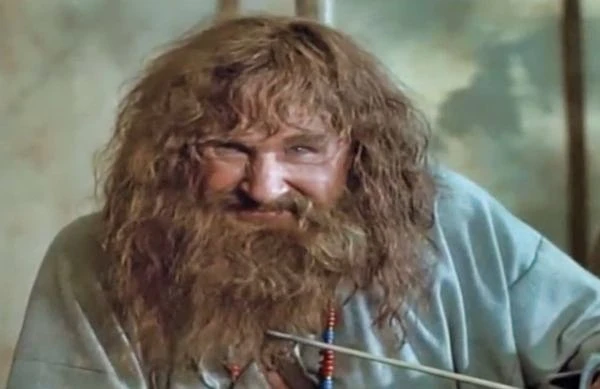
Familiar faces help to tell all the men in uniform apart. Robert Stack, Anthony Zerbe, and Clive Revill are American, French, and British Generals respectively, even if it should be noted that Zerbe's character was actually a Regimental officer, never a General. Jeremy Kemp is suitably substantial as Washington's biggest rival for command of the Continental Army, Major General Horatio Gates. Stephen Macht, Gene Roddenberry 's first choice to play Jean-Luc Picard in Star Trek: the Next Generation, is a tightly wound Benedict Arnold. Look out for Kelsey Grammer and - blink and you will miss him in his first on screen performance - Viggo Mortensen, billed as Vigo, in small supporting roles as junior officers.
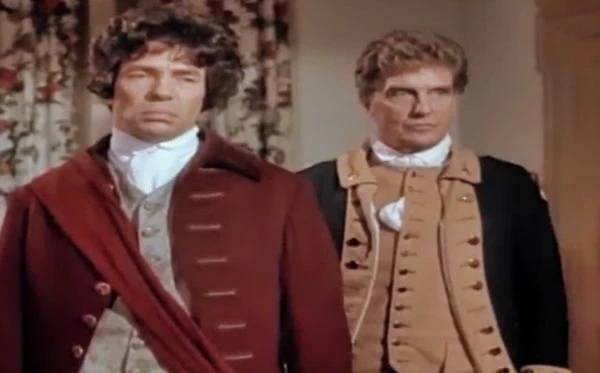
Most memorable is James Mason who gives a very kind interpretation of the ill-fated Major General Edward Braddock, one of the few British officers who appreciated Washington's services to the Crown as much as he felt he deserved: had the Braddock Expedition against the French in the Seven Years War succeeded, Washington might have been given the King's Commission for which he yearned and history might have taken a very different turn.
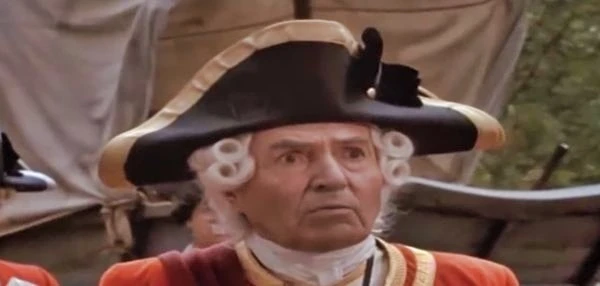
The sudden disintegration of the Braddock Expedition at the Battle of the Monongahela is one of the best sequences in the whole "miniseries." Although some military historians question the accepted reasons for the defeat, the sense of panic as the long column comes under close fire from unseen ambushers in the woods is entirely credible. One cannot help thinking it must have been a big influence on Michael Mann in his feature film 'The Last of the Mohicans.'
Later battles, in the War of Independence, are also very well staged, even if the relatively small numbers are sometimes rather obvious: there is little tension in a charge of about twenty British dragoons against dozens of American riflemen who are behind field fortifications. The tactics of the time are nevertheless generally summed up quite accurately on a small scale.
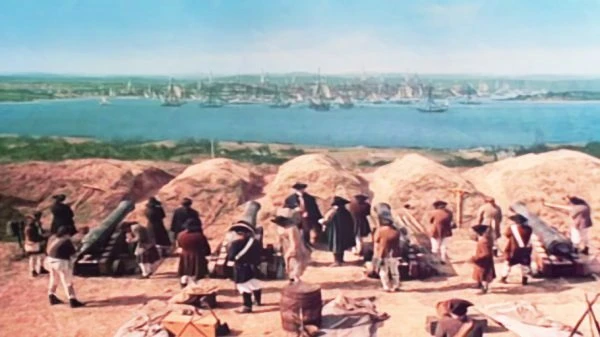
A more reverential tone prevails during the War of Independence episodes. Human drama rather gives way to posed re-enactments of "Great Moments From History" as seen from an American children's book point of view. Human beings are replaced by caricatures: we get the standard noble American leaders, plucky American footsoldiers, and stupid, arrogant Brits.
It is rather underplayed that said stupid, arrogant Brits spent most of the War beating the plucky Americans all over the place. Decisive British victories like the Battle of Brandywine Creek are mentioned but not shown. It is implied that the Battle of Monmouth Court House was an American victory when it was at best a messy draw: its significance was that it showed how the Continental Army could stand on equal footing against regulars after it was given proper professional training by von Steuben and others. Von Steuben is played, with some charm, as comic relief, but in reality it was the mercenary who made all the difference.
The one significant uniquely American victory, the Battle of Saratoga, is also mentioned and not shown, because Washington was not there. This is perfectly legitimate, given that the "miniseries" is about Washington, but the much maligned Gates and Arnold, who basically saved the rebellion at Saratoga, are perhaps treated as unfairly in the script as they were in history.
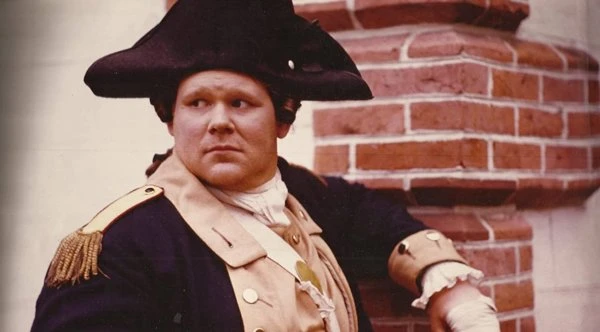
All that said, the whole thing is in general commendable for its respect for historical detail. For example, if Washington's artillery commander looks too young and too tubby, it is a fact that the remarkable Henry Knox was indeed the youngest Major General in the Continental Army and noted for his girth - he was eventually killed by a chicken bone he ate.
The authenticity of the production was strengthened enormously by the fact that most of it was filmed on location. The Americans, at least on the East Coast, have put a great deal of money and effort into preserving historic buildings and sites, and George Washington took full advantage of that. The only slight criticism, from a historical purist not an aesthetic point of view, is that many of these perfectly preserved buildings are too clean and tidy to be true.
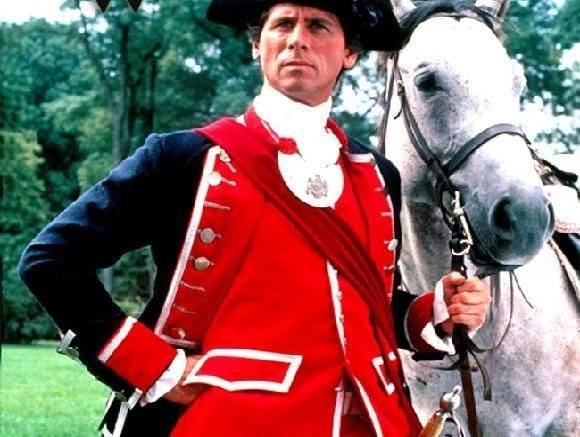
The excellent cinematography makes the most of the locations. Many shots seem to have been composed based on paintings of the period. If there are more starry flags in the backgrounds than there would have been - Washington surely cased his Colours as he crossed the Delaware - this is dramatically excusable, even perhaps mandatory under the circumstances.
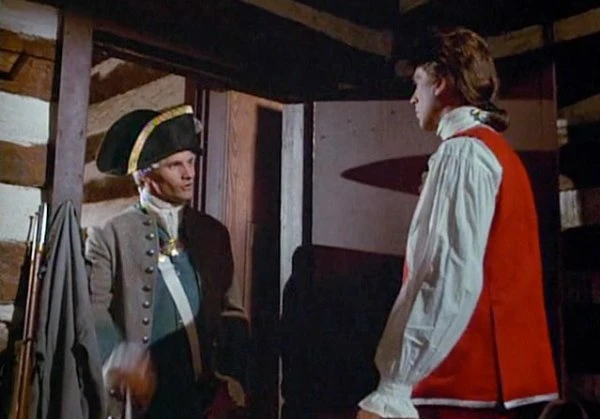
There is wonderful use of light and colour. The period costumes add a great deal to this. The evolution of the Continental Army from an undisciplined bunch of farmers to a professional force can be traced through its uniforms. This is a point very well made when the British surrender at Yorktown. Laurence Rosenthal's score is rousing even if some musical cues are poorly judged, suggesting humour where there is none and overdoing the stirring trumpets.
Indeed, the overall production values are almost faultless. The props department also excels, doubtless much assisted by the collections at the historical sites. Only some of the hair design, which looks like a distinctly 1980s version of 18th Century fashion, now seems a bit out of place.
Despite this, the hair got one of the show's six Emmy nominations, and the whole thing was such a commercial success that a sequel was commissioned, George Washington II: The Forging of a Nation. Lacking the epic subject matter of two major wars, this was not as successful - which is perhaps a story for another day.
Review by John Winterson Richards
John Winterson Richards is the author of the 'Xenophobe's Guide to the Welsh' and the 'Bluffer's Guide to Small Business,' both of which have been reprinted more than twenty times in English and translated into several other languages. He was editor of the latest Bluffer's Guide to Management and, as a freelance writer, has had over 500 commissioned articles published.
He is also the author of ‘How to Build Your Own Pyramid: A Practical Guide to Organisational Structures' and co-author of 'The Context of Christ: the History and Politics of Rome and Judea, 100 BC - 33 AD,' as well as the author of several novels under the name Charles Cromwell, all of which can be downloaded from Amazon. John has also written over 100 reviews for Television Heaven.
John's Website can be found here: John Winterson Richards
Books by John Winterson Richards:
Seen this show? How do you rate it?
Seen this show? How do you rate it?
Published on March 16th, 2021. Written by John Winterson Richards for Television Heaven.


